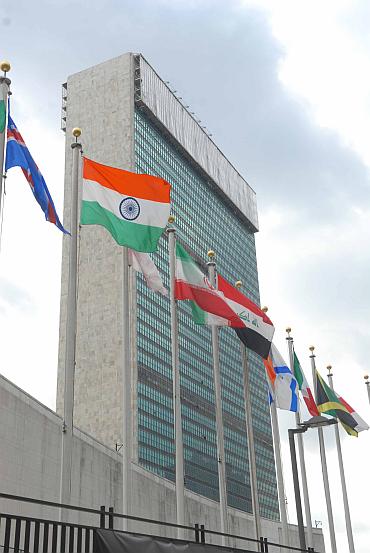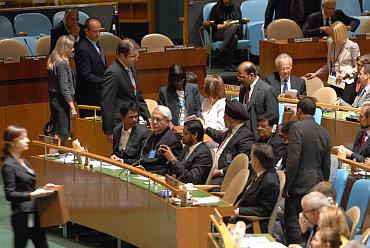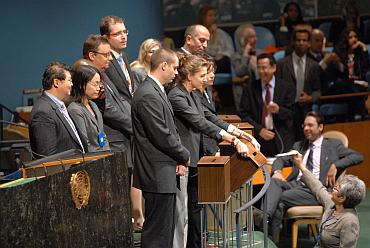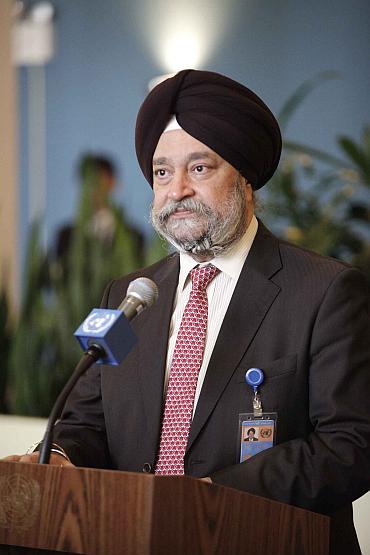Photographs: Paresh Gandhi/Rediff.com Sheela Bhatt in New Delhi
India's election to the United Nations Security Council as a non-permanent member would have been a non-event but for the overwhelming response that India got, which made it meaningful to a small degree. India got 187 votes out of the 190 votes that were polled. One member was absent while one vote was disqualified.
Nevertheless, India's aspiration for permanent membership of the UNSC still has a long, long way to go.
However, External Affairs Minister S M Krishna was visibly excited. He said "three cheers" to Hardeep Puri, head of India's permanent mission at the UN and his team. He also applauded the efforts of his ministry and the various embassies who worked towards this outcome.
"India's non-permanent membership of the UNSC will hardly have any impact or linkage to our claim for a permanent UNSC membership," said a senior officer in the ministry. "The dynamics of both memberships are different, but the world including America would take notice that India got overwhelming support." He said Tuesday's thumping support from the world would increase India's confidence. It's a long way from the 48 votes India earned while bidding for the same seat two decades ago.
In Tuesday's vote, South Africa got 181 and Colombia got 186 votes in different blocs.
'Non-alignment is one of the pillars of India's foreign policy'
Image: Hardeep Puri (centre, second row, in turban), India's representative to the UN casts his votePhotographs: Paresh Gandhi/Rediff.com
When asked about India's likely position on issues like sanctions against Iran, Krishna said India believed in settling issues through negotiations.
In response to a question by rediff.com on India's broader foreign policy at the UNSC, Krishna said, "Non-alignment is one of the pillars of India's foreign policy." He insisted that India will be a responsible member and will "engage" countries on various issues.
When Krishna was asked about permanent membership to the UNSC and support for India's candidature among its five permanent members, he said the United Kingdom and France supported India's claim but Russia had given conditional support with some reservations.
Krishna said Russia wanted "UN reforms to be undertaken by broad consensus only. It's well known that China and the United States have been opposing or keeping slient about India's candidature for various reasons."
'Why was India kept out of the UNSC for 19 years?'
Image: Members cast their vote at the UNSC electionPhotographs: Paresh Gandhi/Rediff.com
Krishna said India would continue to work with like-minded countries and groups to bring about much needed structural reforms to the Security Council. "I have absolutely no doubt that we will utilise our tenure to provide a sense of satisfaction to all our partners and obtain their reaffirmation of the need for a permanent presence for India on the Security Council," Krishna said.
However, India should not hype the victory, said a former diplomat who had served in America. "India will take over the Asian seat in the Security Council vacated by Japan at the end of this year. It will re-enter the Security Council after an interregnum of nearly two decades." Talking off the record, the former diplomat said the real story lay in why India could not even gain a non-permanent membership for 19 long years.
He also said in matters that could affect international affairs and future of the planet, the non-permanent members didn't have much say. He also stated that since only the five permanent members had total control over all the serious issues, it would be a challenge to truly influence the UN affairs.
'India offers a unique example of nation-building'
Image: UN members greet Hardeep Puri after India's successful bidPhotographs: Paresh Gandhi/Rediff.com
When asked if Pakistan voted for India, Krishna said, "It was a secret ballot."
Krishna told journalists that along with membership came responsibility. "Membership of the UN Security Council, of course, entails a higher responsibility. We will live up to that. India will also not only bring ability but add to the legitimacy of the Security Council and be proactive in tackling the scourge of terrorism and strengthening the UN's peacekeeping and peace-building efforts. We will demonstrate to the international community that India on the Security Council is good for the world. India offers a unique and unparalleled example of nation-building. We are willing to share our experience in nation-building with the world."
'Counter-terrorism will be a priority'
Image: Hardeep Puri speaks at United NationsPhotographs: Jay Mandal/On Assignment
Elaborating on India's priority in world affairs, Krishna said, "We live in a troubled neighbourhood. Our immediate priorities in the Council will include peace and stability in our extended neighbourhood, including Afghanistan, the Middle East and Africa. Counter-terrorism, including preventing the proliferation of weapons of mass destruction to non-State actors and strengthening the UN's peacekeeping programme would be a priority."
India's election as a non-permanent member of the Security Council is for two years beginning January 2011. It is of significance that, for the first time, the UNSC will witness the simultaneous presence of all BRIC (Brazil, Russia, India, China) and IBSA (India, Brazil, South Africa) countries and three of the four G4 nations (India, Brazil and Germany).
Japan is the fourth member of the G4, all of whom have pledged to support each other's bid for permanent membership of the UNSC.






article